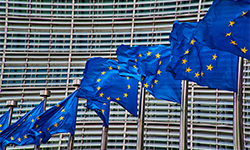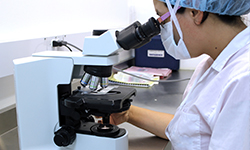BusinessEurope Headlines No. 2020-16
EU trade agreements should include cross-border data flows provisions

Data flows are key enablers of innovation and high-quality goods and services across the board. Data flows also keep our citizens, institutions and markets connected. This role becomes more important now than ever, as we experience the global COVID-19 pandemic. In this regard, in a letter addressed to the European Commissioner for Trade, Phil Hogan, BusinessEurope supports the inclusion of provisions on cross-border data flows in the EU's trade agreements. These should be ambitious in terms of enabling the flow of data across borders, in order to effectively tackle issues of data localisation while, at the same time, ensuring the protection of personal data and privacy. BusinessEurope shares concrete ideas on ways to improve the EU's approach on this matter in the context of multilateral negotiations, such as for reaching e-commerce agreement in the WTO, and bilateral negotiations, such as with the UK, Japan and Australia.
![]() Contact: Sofia Bournou
Contact: Sofia Bournou
Our comments
Europe and the coronavirus crisis
By Pierre Gattaz, BusinessEurope's President
 Contrary to what you can sometimes read, there is no absence of Europe in the responses to the coronavirus crisis. I would take two recent examples: first, the swift agreement between the Eurozone ministers on a first common economic response to the current crisis. Second, the European solidarity and collaboration in health care.
Contrary to what you can sometimes read, there is no absence of Europe in the responses to the coronavirus crisis. I would take two recent examples: first, the swift agreement between the Eurozone ministers on a first common economic response to the current crisis. Second, the European solidarity and collaboration in health care.
The hesitations on the strategy to be followed were mostly due to national governments and lack of knowledge about the virus. In terms of coordination, the United States haven’t done any better.
However, much remains to be done in Europe. Post-crisis management will be the real test. Because the effects of the economic and social crisis that awaits us are potentially as destructive on a human level as the current health crisis.
Cash
In the very short term, the common plan to support economic activity and national short-time work schemes has to be concretely brought to life with employees and SMEs. Implementation of these measures could be summed up in three key words: simplicity, speed, cash. Let’s show the EU is not the complex machinery that some are claiming it to be, and focus on cash since this is the crucial matter for SMEs and small-caps. And the problem will only get worse.
Coordination of containment exit plans need to be considered as the European economy is deeply intertwined. This does not necessarily mean the same method for all countries, but at least a broad vision of the priority sectors and regular coordination so that economic activities resume quickly and broadly.
In addition, Europe must gradually take the lead at the international level in multilateral fora to restore international trade. Not out of ideology, but out of pragmatism: our short-term industrial and economic rebound fundamentally depends on trade. Globalisation should continue to evolve towards more transparency and mutual respect. This should not however prevent a resumption of trade in the short term.
At the same time, Europe must prepare for the rebound and, collectively, transform the current crisis into opportunities for our continent. At BusinessEurope, we are convinced that we must make every effort to bounce back quickly and get out of the crisis stronger together.
This implies first of all following a clear course of action around three main principles:
- Solidarity between the member states, but also between businesses of all sizes within the European Union;
- Responsibility to protect people as a priority, but also businesses, which are the source of growth, jobs and social well-being;
- Action to avoid missing opportunities. And acting swiftly, even if it means adjusting later.
A common ambition
It also means defining a vision, a common ambition that would drive and guide us. We had already outlined an ambition of the kind around three key words: prosperity, people, planet. These still seem relevant for us to exit the crisis. It’s by keeping these three pillars balanced, without one overpowering the other, that we can build a Europe we can be proud of in the XXI century.
This requires a collective reassessment of the European Commission’s priorities. To us, it is essential in the future to insist on the following:
- Sustainable development and everything related to the ‘Green Deal’: a lesson from this crisis is also that we must rethink our relationship with nature and resolutely continue on the set path of an economy that is more respectful of the planet. The current crisis however requires modulating the implementation of the Green Deal according to the exceptional constraints that European companies will face.
- The skills and training of employees, and of all Europeans. More than ever, citizens must develop their capacity for action and adaptation in a changing world.
- The Single Market, together with the need for a real strategy to support the competitiveness of our companies, especially in the industrial sectors. What the crisis highlights is our ‘lack of autonomy’ over some key elements in our industries. It’s up to us to create the conditions for part of the value chains to return to our continent. Beyond words, this requires concrete, coordinated action. Let’s not forget however that globalisation also means many economic opportunities, which we should continue to make the most of.
- Eventually, and this is a revolution announced long ago, digital technology has clearly become, in the wake of this crisis, an indispensable tool. And it will be more and more tomorrow, at all levels: social contacts, of course, but also industry, health, services, work. Our economy needs to be further digitalised in a relevant, smart and humane way. An ambitious action plan for digitalising our society is therefore a necessity.
As you can see, Europe's work programme should be packed in the coming months. This will trigger debates, controversies, oppositions. But this can be useful. Such discussions are sound as long as they do not paralyse decision-making, because they allow to pave a common way.
Finally – maybe one of the biggest challenges – Europe should not remain deaf to the rest of the world. Africa, our neighbour, is likely to be hit hard by the health and economic crisis in the coming weeks. Europe will have to show solidarity, and foster much needed co-development in the short to medium term.
*This article was initially published in La Tribune, in French, and it has been slightly adapted.
Contact: Nathan Munch
COVID-19 pandemic, a wake-up call for R&I
By Carolina Vigo, Adviser for Research and Innovation
 Research and innovation (R&I) is under the public spotlight since the COVID-19 pandemic broke out. Researchers are asked to help containing the spread of the epidemic and facilitate care for those affected; innovators are solicited to develop vaccines and pharmaceutical treatments in an accelerated way.
Research and innovation (R&I) is under the public spotlight since the COVID-19 pandemic broke out. Researchers are asked to help containing the spread of the epidemic and facilitate care for those affected; innovators are solicited to develop vaccines and pharmaceutical treatments in an accelerated way.
Whilst the world has been caught unprepared to deal with this crisis, we are all – at different levels/in our own capacity – now working to exit the pandemic and prepare for the recovery phase. Different responses might be suggested for each specific policy area, but it appears clear that R&I will need to be prioritized in the post-COVID European (and national) agenda. Although it is probably too early to assess the full economic and social impacts of the pandemic and related containment measures, there is already a certain agreement in the political, business and research spheres that the "world of tomorrow" needs to put a greater emphasis on resilience, flexibility to production systems and collaboration. These three imperatives can only be addressed by R&I.
Two-thirds of research and development (R&D) in Europe is performed by industry. However, businesses are and will continue to be under pressure to minimize job losses and disruptions to the supply chains in the coming months. Despite the need for more innovative solutions, some companies might need to reduce their R&I investments in order to survive. It therefore becomes of paramount importance that policymakers promote a funding and regulatory environment that is innovation-supportive and fosters research collaboration. These are the means to create an innovative Europe which has a strong voice on the global stage and promotes economic growth and citizens’ well-being.
The future Multiannual Financial Framework, the revitalised European Research Area, the Horizon Europe’s Strategic Planning and Missions are the upcoming policy rendez-vous to unleash Europe’s scientific and innovation potential and strengthen our respond capabilities to global crises, which might occur more cyclically. The European Commission (and Member States) shall use these opportunities to prioritise R&I in the EU’s agenda in order to step up our risk preparedness and response, and build the resilient, flexible and collaborative "world of tomorrow".
Participating in the BusinessEurope’s RDI survey last year, companies stated that they need more (1) public financing, (2) innovation-friendly legislation, (3) skilled people, (4) collaboration. The COVID-19 pandemic has exacerbated these needs, which means that public support to R&I has become even more pressing.
![]() Contact: Carolina Vigo
Contact: Carolina Vigo
Directive on Administrative Cooperation: flexibility needed
 BusinessEurope sent a letter to the European Commissioner for Economy, Paolo Gentiloni, setting out its concerns on the approaching implementation of the Directive on Administrative Cooperation (DAC6). Under DAC6, EU-businesses can be required under certain circumstances to report any cross-border tax arrangements to their national tax authority on 1 July 2020. The letter argues that whilst we continue to support the fight against tax fraud, the current lockdown measures mean many businesses’ tax departments are restricted in accessing their tax data, and are heavily occupied with responding to the consequences of the COVID19-crisis. At the same time, national tax administrations have not been able to provide clear guidance on the exact details and requirements of the DAC6. The letter calls on the European Commission to urgently find a way to provide flexibility on the implementation date of this directive to member states.
BusinessEurope sent a letter to the European Commissioner for Economy, Paolo Gentiloni, setting out its concerns on the approaching implementation of the Directive on Administrative Cooperation (DAC6). Under DAC6, EU-businesses can be required under certain circumstances to report any cross-border tax arrangements to their national tax authority on 1 July 2020. The letter argues that whilst we continue to support the fight against tax fraud, the current lockdown measures mean many businesses’ tax departments are restricted in accessing their tax data, and are heavily occupied with responding to the consequences of the COVID19-crisis. At the same time, national tax administrations have not been able to provide clear guidance on the exact details and requirements of the DAC6. The letter calls on the European Commission to urgently find a way to provide flexibility on the implementation date of this directive to member states.
![]() Contact: Pieter Baert
Contact: Pieter Baert
Calendar 
- 5 June: BusinessEurope Council of Presidents
- 22-26 June: EU Sustainable Energy Week 2020
- 9-10 September: 8th International Conference on Sustainable Development
Reminder: please have a look at our privacy policy